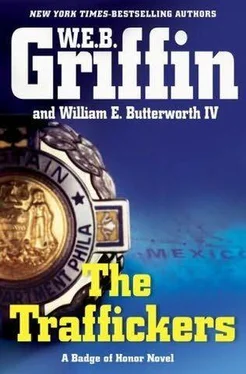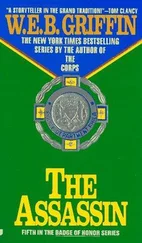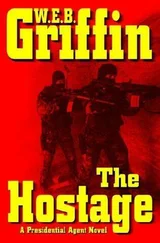W.E.B Griffin - The Traffickers
Здесь есть возможность читать онлайн «W.E.B Griffin - The Traffickers» весь текст электронной книги совершенно бесплатно (целиком полную версию без сокращений). В некоторых случаях можно слушать аудио, скачать через торрент в формате fb2 и присутствует краткое содержание. Жанр: Криминальный детектив, на английском языке. Описание произведения, (предисловие) а так же отзывы посетителей доступны на портале библиотеки ЛибКат.
- Название:The Traffickers
- Автор:
- Жанр:
- Год:неизвестен
- ISBN:нет данных
- Рейтинг книги:3 / 5. Голосов: 1
-
Избранное:Добавить в избранное
- Отзывы:
-
Ваша оценка:
- 60
- 1
- 2
- 3
- 4
- 5
The Traffickers: краткое содержание, описание и аннотация
Предлагаем к чтению аннотацию, описание, краткое содержание или предисловие (зависит от того, что написал сам автор книги «The Traffickers»). Если вы не нашли необходимую информацию о книге — напишите в комментариях, мы постараемся отыскать её.
The Traffickers — читать онлайн бесплатно полную книгу (весь текст) целиком
Ниже представлен текст книги, разбитый по страницам. Система сохранения места последней прочитанной страницы, позволяет с удобством читать онлайн бесплатно книгу «The Traffickers», без необходимости каждый раз заново искать на чём Вы остановились. Поставьте закладку, и сможете в любой момент перейти на страницу, на которой закончили чтение.
Интервал:
Закладка:
Delgado smiled broadly into the mirror.
Mentioning family brought smiles to those younger faces.
So there’s no question they’re illegal-and tired from that long trip.
There’s also no question not everyone is convinced I’m their new friend.
But they’re also not trying to run.
Maybe because they are exhausted.
As he reached for the gearshift, he glanced at the instrument cluster. The needle of the fuel gauge showed full. The engine temperature needle was in the red but just starting to move back toward the green. The odometer read 218,990.
Not its first trip.
Hope it makes it to the other side of downtown.
He put the van in gear and drove away from the convenience store fuel pump island.
Juan Paulo Delgado, with Jorge Ernesto Aguilar following two car lengths back in the brown Ford Expedition, followed all the laws of the road as he drove the Dodge Ram passenger van. He did not go faster than the speed limit-as best he could tell, because the needle of the worn-out speedometer tended to bounce occasionally-and he faithfully used the blinker when changing lanes and making turns.
He knew that that was not a guarantee he would not get pulled over by the police. They could stop a vehicle for damn near anything if they wanted. But it was better than being careless and stupid by drawing their attention.
He pulled onto Stemmons Freeway and took it south, skirting the shiny tall buildings of downtown Dallas. He picked up Thornton Freeway eastbound. A mile later, he took the exit that went past Fair Park-or what he called Gringo Park. It had the nice open-air concert shell where the rock bands and country music singers performed, mostly on weekend nights. It also had the football stadium that every New Year’s featured the Cotton Bowl college championship game and every October, during the Texas State Fair, hosted the Texas-Oklahoma college rivalry game.
Delgado knew that all kinds of gringos gravitated to this part of town for those events. And then, when the events ended, promptly got the hell out of the rough neighborhood.
A half-mile later, he turned off Hatcher Street into the driveway of an older one-story house.
Across the street from the house was Juanita Craft Park. It was what Delgado thought of as a more representative park for those who lived in these parts. The football games played there used a soccer ball, not the pigskin kicked around in the Cotton Bowl. Spanish-language billboards advertised fast-food restaurants, Latino radio stations, various brands of booze. And Juanita Craft Park abutted a stream, one that was more of a rancid drainage ditch and flowed under the train track trestle two blocks south.
The one-story older house sat by itself well back from Hatcher Street. Its wooden siding had white paint that was chipped and peeling. It was surrounded by chain-link fencing that blocked any view of the backyard.
In the backyard were usually a half-dozen utility trailers loaded with lawn care equipment, as well as a detached wooden garage. Beyond the back fence, a thick tree line separated the house and its property from a children’s play-ground, on the far side of which was another line of trees and thick shrubbery, which grew along the train track.
All of which served to further isolate the house, though there were some houses far across the four lanes of Hatcher.
The headlights of the Dodge Ram van lit up the chain-link gate.
Out of the shadows there suddenly appeared a man.
Good man, Miguel. You’re here.
Now get the damned gate open.
Miguel Guilar physically looked a lot like Delgado. He wore black jeans, a dark T-shirt, and black athletic shoes. They had grown up together and graduated from North Dallas High School, which was across the freeway and a couple miles away. At almost ninety years old, the school had outgrown its name. Realistically, present-day North Dallas was the sprawl of suburbia much farther north.
Guilar pushed on the chain-link gate and it swung inward. Delgado eased the van through the gap and into the dark, unlit backyard. When he looked toward Guilar, he saw that Miguel held a black pump shotgun, its butt on his hip. Then Guilar stepped back into the shadows. El Cheque rolled the Expedition in behind the van, and Guilar closed the gate.
Except for one of the toddlers repeatedly saying, “Mama, Mama, Mama,” it was deafeningly quiet in the van. Delgado thought he could feel the tension, if not some terror.
“Welcome!” he said cheerfully in Spanish as he pulled the van to a stop and shut off the engine. “You have made it! Your journey is over! My associates will help you bring your things into the house. And then we can get you on your way.”
He opened the driver’s door and hopped to the ground.
Miguel Guilar was walking up to him with the gun. Delgado saw that it was his black Remington Model 1300 pump-action twelve-gauge. He knew that Guilar kept his “Defender” loaded with six rounds of double-ought buckshot.
Delgado said, “You have the zip ties?”
Guilar reached into the back pocket of his black jeans and pulled out the two-foot-long plastic strips that were generally used to quickly and securely bind damn near anything they would fit around. There were at least twenty in the bundle, held together with a rubber band. Delgado stripped two from the bundle and slipped them into his pants pocket.
“We separate the women from the men first, okay?” Delgado said in English as he pulled the Beretta from the waistband of his pants. “Just follow my lead.”
“Okay,” Guilar said, then walked with Delgado to the large sliding door on the other side of the van.
Guilar and Delgado were standing in front of the sliding door when Aguilar walked up to them, holding the TEC-9 that had been in the Expedition’s console with his Beretta.
No surprise that he would like that gun.
He likes looks.
Delgado said to him, “El Cheque, you take the females into the house.”
“S?,” he replied. “One minute.”
He trotted to the back door of the house and opened it. The lights from inside backlit him. Then he trotted back to the van.
“Okay,” El Cheque said.
Delgado, keeping his Beretta along his right thigh, opened the sliding door with his left hand.
“Women and children first!” Delgado said in Spanish, his tone upbeat. “Come, come! Follow El Cheque. He will show you to the house.”
Delgado looked at the woman sitting at the end of the second-row bench seat nearest the door. She was at least forty, overweight, and wholly unattractive. Slowly, hesitantly, she slid to the edge of the seat and stepped to the ground. She pulled a dirt-smudged silver backpack out from under the seat.
That is all of her possessions, Delgado thought.
Amazing.
Then El Cheque gestured toward the open back door of the house.
The woman did not move. She looked in the van to the dark-haired girl of about eight who’d been sitting beside her. The woman waited until the girl exited the van and collected her small vinyl overnight bag. The girl walked to the woman and took her hand. And they stood there.
The angry man Delgado had seen in the rearview mirror was the last one on that bench seat. He started sliding across the seat toward the door.
“Alto! ” Delgado said forcefully, holding up his left hand palm outward.
The man stopped. He made an angry face.
“That is my family,” he said, gesturing toward the woman and child.
You poor bastard, Delgado thought, glancing at the woman.
Love is blind.
“Women and children first,” Delgado said again. He looked to the next row back, which held four teenage girls. “Come, ladies. You’re next.”
As they stepped off, Delgado caught El Cheque out of the corner of his eye. El Cheque was watching with growing interest as the teenage girls exited.
Читать дальшеИнтервал:
Закладка:
Похожие книги на «The Traffickers»
Представляем Вашему вниманию похожие книги на «The Traffickers» списком для выбора. Мы отобрали схожую по названию и смыслу литературу в надежде предоставить читателям больше вариантов отыскать новые, интересные, ещё непрочитанные произведения.
Обсуждение, отзывы о книге «The Traffickers» и просто собственные мнения читателей. Оставьте ваши комментарии, напишите, что Вы думаете о произведении, его смысле или главных героях. Укажите что конкретно понравилось, а что нет, и почему Вы так считаете.











